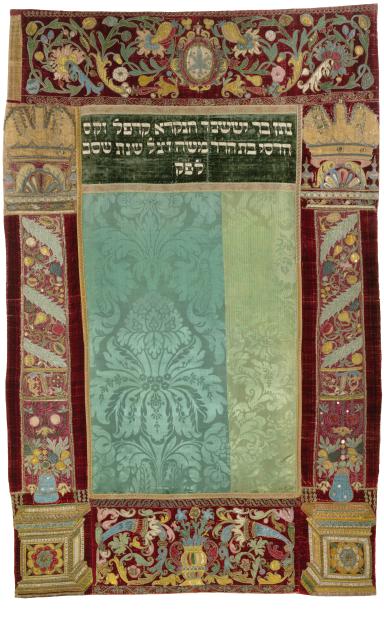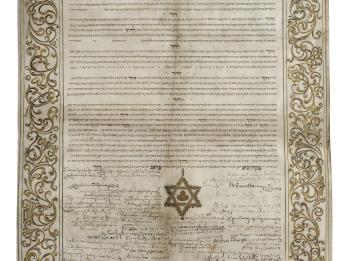Takkanot (Regulations)
The Jewish Community of Prague
1611
Regarding Torah study it should be thus. Each one shall ensure that he learn what he can for at least one hour each day or pay a rabbi for this purpose. If he cannot, he should read the godly books that exist in Yiddish, and the more the better. And educated rabbinical students shall establish fixed times to study Torah as much as possible, neglecting their earthly occupations and the rest of their pursuits. So too every man shall be very careful concerning tzitzit and mezuzah, as is suitable and as is fitting, extremely careful.
Regarding women who trade and do business dealings and who go out of the house for this purpose. They shall swear an oath on the Torah scrolls that none of them will from now on enter the house of any non-Jew alone, not even to the lowest hall that is open to the street on the ground floor. And no woman should in any way enter further into any room, unless her husband accompanies her into the same room, or at least a male servant or a young boy accompanies her. And if they do not wish to allow her husband or the young boy inside, or she goes into the room with her husband or the boy and they then eject her husband or the boy from the room or order them to leave, she too should depart and sell them nothing. In general, no woman should enter any non-Jewish home alone on the threat of all the curses and reproaches which appear in the Torah and they should swear concerning this as is described above.
And moreover, anyone who discovers that a woman has transgressed the above must inform the community leaders of this, or else he will receive a heavy punishment and pay a fine of twenty gold gulden.
[A]nd if her boy left the room and she remains alone in the room, the boy shall straight away be reported to the leaders and receive the above punishment. [ . . . ] The same if we find out that a woman has done so, [ . . . ] she should be punished in addition to all these curses and reproached with a great punishment which is very hard to bear, also with fines. [ . . . ] No one shall be spared who commits this great sin, because it is severe and terrible. Therefore, each woman should think about God, blessed be His name, and her soul and her honor and her children. And her husband and other pious acquaintances should be sure to warn her about not transgressing this regulation. And at any rate, this curse shall apply to each and every woman, even if she is not immediately aware that she has transgressed.
Regarding maidens who go out walking in the street by day or by night—both members of the community and maidens from outside the town—from today onward, they shall not go out walking alone or together with others, not by day and even more so not by night, at the risk of great punishment and all the curses that are found in the Torah, because their honor and modesty are of great importance. And when a maiden is sent somewhere, she shall not linger outside, not even to talk with someone on the street. Therefore, whoever sees a maiden going out walking, whether by day or night on the street, whether she is the daughter of the household or a servant, whether a stranger or member of the community, whoever it may be, he must inform the leaders [ . . . ] of this, or else he will be punished with a great punishment and fine of ten gold ducats and the same maiden shall be punished with great insults and shaming that will be difficult for her to bear. And no one shall be spared, this applies to everyone equally. Also, each householder should be warned not to send any maiden out of the house by night to bring beer or anything else; as far as possible he should send someone else because evil, God forbid, can result from this.
Regarding prostitutes, from this day onward they must not be employed as wet nurses. They shall all be removed from our holy community before Rosh Ḥodesh Heshvan 5372 (1611), may it bring upon us blessings. And from that day onward no prostitutes may be found any further in our community. And any householder who transgresses this and keeps a prostitute in his house, that man will be fined ten golden ducats for charity. And this punishment will also be imposed on anyone who knows that a prostitute is to be found in the home of a householder in our holy community, [if he does not] inform the leaders of the community court [ . . . ]. And whoever, God forbid, from this day onward becomes a prostitute, this will be her verdict: immediately and directly an iron chain will be placed on her neck and guards shall remove her from the community and she will never again be able to come into our holy community. And all the people will listen and hear and sin no further.
Regarding boys or servants who may commit debauchery or abominable acts with maidens or with otherwise unmarried women, be it with their mouth or their hands, they shall be removed from the holy community with great insults and shaming so that their parents shall weep in their grave. Thus everyone shall be careful that he or she behave with modesty and diligence and purity and holiness, as befits this holy nation, to be a garden enclosed; a spring shut up, a fountain sealed (Song of Songs 4:12). And the Holy One, Blessed be He, will remove His anger and fury and sorrow and the evil angels from upon us and the entire house of Israel. Amen.
Credits
Published in: The Posen Library of Jewish Culture and Civilization, vol. 5.





